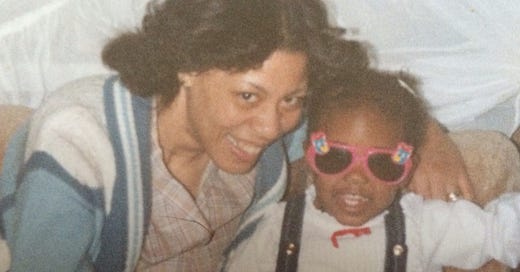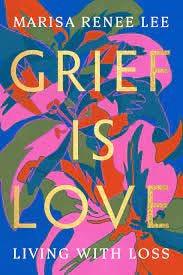Your life/death is a new feature sharing stories and insights from people whose lives have been shaped by death.
One of the first books I read after my mother died was Grief is Love by Marisa Renee Lee. It’s a beautiful read and fundamentally changed how I viewed the sad state I was in. So naturally, Lee, an author and grief advocate, was the first person I reached out to when starting PAPILLON to discuss life, death, and carrying on the legacy of our loved ones.
Her reflections on losing her mother Lisa when she was in her 20’s, and then losing a much wanted pregnancy, are framed by the belief we don’t have to and shouldn’t even try to “get over” the loss of a loved one, but we instead need to work on deciding how we live our lives in a way that honours our grief, but doesn’t deny us access to joy.
Lee defines grief as the repeated experience of learning to live in the midst of a significant loss. She felt called to write the book because she thinks we tend to get death, dying and grief wrong. She had it wrong. As a successful, “type A” person she prepared for the impending death of her mother and thought that would make it easier to process and move on from. But now knows no matter how prepared, grief isn’t something to get over or get through. It is something we live with as an on-going expression of love.
“I lost my mom in February of 2008. And I thought I was really well prepared for her death. I was very proud of myself. I read the books, I did the research. I had the spreadsheet with all of her wishes, concerns and needs. And I thought because I was so well prepared when she died - not that it would be easy, you know, I wasn't I wasn't that foolish - but I did think that it would be easier.
Then it happened and I very quickly realized just how wrong I was. It was awful. And because I had prepared, I spent months beating myself up for feeling so sad. Like, ‘you should be fine - what is wrong with you?’ And finally, about six months after she died, I decided that I wasn't the problem. The problem is in how we discuss and how we treat people who are grieving and people who are dying.”
She wants to help normalize this layered experience of grief - the days when we feel sad and overwhelmed by their absence and also these moments where you laugh and remember them joyfully.
Lee decided the best way for her to deal with loss was to find ways to continue to involve her mother in her life today. And it turns out, leading research on grief and loss supports what she had decided to do. It's called the continuing bonds theory, and argues that the healthiest way to move through the toughest parts of grief and live a full and joyful life after loss, is by finding your own way to continue your relationship with the deceased. So that's what she does now.
“You have every right when you lose someone you love to decide how you want to celebrate them and to define for yourself what their legacy means to you. And it's different for everyone.
Often people think of legacy as something that they have to put out in the world for their person - planning that perfect funeral, starting the non-profit, writing a book, launching an award in their honour. And I think all of those things are wonderful, and I've done most of them, but fundamentally, that's about publicly honouring your person - legacy is something much more internal. Legacy is about values. How you choose to live and the quieter ways that you let their life continue to shape and impact yours.
My mom was a super generous person who grew up with no money, nothing fancy, but she was still known for her generosity. So that's one of the things that I try to bring along with me wherever I go. And every Sunday she would make pancakes before church, even when she was sick. So the week that Grief is Love came out I made pancakes for the first time for our infant son. Food has become a way to carry her with us.
I really want to encourage people to do whatever feels right for them to celebrate and remember their loved ones. Don't feel like you have to follow anybody else's playbook.”
Lee wrote Grief Is Love in the hope that she could avoid unnecessary suffering for other people. She suffered a lot by constantly thinking she was doing it wrong and wants that to stop. Her advocacy work is also focused on ensuring that healing isn't a privilege. That everyone has access to the tools that can help them heal. Where she lives in the USA there are very few resources that help you withstand the impact of loss and helpful things like therapy, paid time off, child care so you can have a break to deal with your feelings are out of reach for many. So her work aims to make the tools for living with grief accessible to all. And a big part of that is acknowledging grief and the multitude of feelings that come with it.
“The number one thing that has been proven over and over again that truly makes these difficult feelings easier is acknowledgement. Naming our feelings reduces their power over us. So when it's hard, when you're feeling really sad, anxious or just really missing them - be honest about it. Feel it. And then do whatever helps you cope.”
Lee knows grief isn’t easy but believes when we give ourselves permission to grieve, when we care for ourselves, when we commit to staying connected to our loved ones in the ways that feel most authentic to us, it becomes possible to really live with loss.
For more on Marisa Renee Lee visit www.marisareneelee.com and follow @MarisaReneeLee. She is hosting an upcoming Grief is Love retreat Sept 2024.






